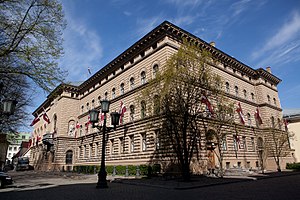Ahranaian Directorate of Intelligence: Difference between revisions
No edit summary |
m (→Section EC-11) |
||
| (4 intermediate revisions by one other user not shown) | |||
| Line 45: | Line 45: | ||
* Counter-Subversion: to counter illegal subversive activities (e.g. violence, threats and harassment targeting elected representatives, public officials and journalists) intended to affect policy-making and implementation, or prevent citizens from exercising their constitutional rights and freedoms. | * Counter-Subversion: to counter illegal subversive activities (e.g. violence, threats and harassment targeting elected representatives, public officials and journalists) intended to affect policy-making and implementation, or prevent citizens from exercising their constitutional rights and freedoms. | ||
* Counter-Terrorism: preventing and detecting terrorism; this includes acts of terrorism directed against Ahrana or foreign interests within the borders of Ahrana, as well as terrorism in other countries and the financing and support of terrorist organizations in Ahrana. | * Counter-Terrorism: preventing and detecting terrorism; this includes acts of terrorism directed against Ahrana or foreign interests within the borders of Ahrana, as well as terrorism in other countries and the financing and support of terrorist organizations in Ahrana. | ||
* Dignitary Protection: providing security and close protection officers at state visits, to senior public officials (e.g. the Speaker of the Parliament, Chancellor, members of the Parliament and the Government, including State Secretaries and the Cabinet Secretary), the Royal Family, and foreign diplomatic representatives. | * Dignitary Protection: providing security and close protection officers at state visits, to senior public officials (e.g. the Speaker of the Parliament, Chancellor, members of the Parliament and the Government, including State Secretaries and the Cabinet Secretary), the Royal Family, and foreign diplomatic representatives which the FPS is a Suborganization to the ADI. | ||
* protective Security: providing advice, analysis and oversight to companies and government agencies of importance to national security, in addition to background checks. | * protective Security: providing advice, analysis and oversight to companies and government agencies of importance to national security, in addition to background checks. | ||
| Line 51: | Line 51: | ||
In 2017 the ADI became the sole Security and Intelligence Agency outside the military of Ahrana, neither the Government nor individual ministers have the right to influence how an agency decide in a particular case or on the application of legislation. This also applies to the Security Service, which instead is governed by general policy instruments. What sets the Security Service apart from other agencies is that most directives guiding the Service are classified on the grounds of national security, along with the bulk of the reports it produces. The Service is led by a Director-General, Alexandria M. L. Core Former President of Ahrana, who is titled as either Director-General or Head of the ADI and Security Services. Operations are led by a Chief Operating Officer, reporting directly the Head of the Security Service. He is in turn assisted by a Deputy Chief Operating Officer and an Office for Operations. The Service is organized into four departments and a secretariat, each led by a Head of Department. | In 2017 the ADI became the sole Security and Intelligence Agency outside the military of Ahrana, neither the Government nor individual ministers have the right to influence how an agency decide in a particular case or on the application of legislation. This also applies to the Security Service, which instead is governed by general policy instruments. What sets the Security Service apart from other agencies is that most directives guiding the Service are classified on the grounds of national security, along with the bulk of the reports it produces. The Service is led by a Director-General, Alexandria M. L. Core Former President of Ahrana, who is titled as either Director-General or Head of the ADI and Security Services. Operations are led by a Chief Operating Officer, reporting directly the Head of the Security Service. He is in turn assisted by a Deputy Chief Operating Officer and an Office for Operations. The Service is organized into four departments and a secretariat, each led by a Head of Department. | ||
=Structure= | |||
The ADI is structured differently than most of the other Intelligence Agencies in the past and current usage, as it stands today the ADI is composed up of four sections that create the entire Directorate. Each section is called a Directorate or Section depending on the area it is responsible for: | |||
* Directorate A: Intelligence Command | |||
* Directorate B: Cybercommand | |||
* Section EC-11: Section for Special Information Collection | |||
* Protection Services: Federal Protection Service | |||
==Directorate A== | |||
In this Directorate the sole responsibility is to take all Intelligence Reports and Protection Requests and Reports and compile them into a National Security Reports for the Federal Government and the Diarchs to review daily and sometimes even multiple times a day. The Intelligence Command or Directorate A is also where all commands and orders for all Directorates and Sections plus Agents come from and all orders have to be followed through unless they violate the basic principles of life which Command is not allowed to make such orders. | |||
==Directorate B== | |||
In Directorate B the sole responsibility of this command is to monitor all cyber attacks and to preform them if need be on the enemies of the Ahranaian People. This directorate also gathers information on the enemies of the state through Warrants granted by the Judicial System which is required for any Cyber Data Collection and that is for any type of Data Collection on any person. | |||
==Section EC-11== | |||
This section is a highly classified section, which information on this Section is sensitive and not much is known about the Section. What is known that only the Chancellor, Defense Ministers, and the Diarchs know of the existence of this section only. | |||
{{Ahrana Navbox}} | |||
{{Eurth}} | |||
[[Category: Ahrana]] | |||
Latest revision as of 03:21, 18 September 2022
 | |
| Agency overview | |
|---|---|
| Formed | March 12, 1912 |
| Jurisdiction | Government of Ahrana |
| Motto | To Operate Unacknowledged. |
| Employees | Classified |
| Annual budget | Classified |
| Minister responsible |
|
| Agency executive |
|
The Ahranaian Directorate of Intelligence or the ADI is the Intelligence Agency of Ahrana, tasked with Domestic, Foreign and Signal Intelligence and protecting national security.
History
The predecessor of the ADI before 1912 was the Ahranaian Security Service that acted as the Police and Intelligence Services for the realm of the Second United Kingdom which was created in 1825 by Royal Decree, that decree merged the then Royal Constabulary with a new Security Service that was to be called the Ahranaian Security Service. The Security Service became associated with corruption and scandal's that in 1910 the Security Service was abolished and the Military Intelligence Agency took over all Intelligence related roles with the Police taking all Security roles. In 1912 by a new Royal Decree the Ahranaian Directorate of Intelligence was created, upon its creation several Security Acts were passed by the Government to insure the ADI stayed in line with its responsibilities and roles as well as the Law.
Mission
The Mission of the ADI focuses mostly on domestic non-military threats to Ahranaian national security as well as having a major role in the Military intelligence Services as well due to the nature and structure of the ADI. The ADI is charged with collecting intelligence and assisting in combating domestic and foreign threats to national security.
Oversight and Accountability
The Ministry of the Interior has Oversight into all Activities of the ADI as well as the Federal Police to which the Minister of the Interior coordinated with the Director-General of the ADI as well as with the Federal Police Commissioner. Oversight is provided by three committees:
- A Review Board called the Board of Intelligence and Security, appointed from the Parliamentary Committee of Internal Affairs
- A Oversight Committee called the Intelligence and Security Oversight Committee, appointed from the Parliamentary of Internal Affairs
- The Committee for Intelligence and Security Services, chaired by all Members of the Parliament of the Kingdom
The ADI publishes an annual report which includes its budget. The published version contains redactions where information is deemed sensitive.
The ADI can be forced by the courts to publish any records held on a private citizen, but it may keep secret information that is relevant to current cases. No information that is less than five years old will be provided under any circumstance to private citizens about their records.
Areas of Responsibility
- Counter-Espionage: preventing and detecting espionage and other unlawful intelligence activities; targeting Ahrana, its national interests abroad, and also foreign interests and refugees within the borders of Ahrana.
- Counter-Subversion: to counter illegal subversive activities (e.g. violence, threats and harassment targeting elected representatives, public officials and journalists) intended to affect policy-making and implementation, or prevent citizens from exercising their constitutional rights and freedoms.
- Counter-Terrorism: preventing and detecting terrorism; this includes acts of terrorism directed against Ahrana or foreign interests within the borders of Ahrana, as well as terrorism in other countries and the financing and support of terrorist organizations in Ahrana.
- Dignitary Protection: providing security and close protection officers at state visits, to senior public officials (e.g. the Speaker of the Parliament, Chancellor, members of the Parliament and the Government, including State Secretaries and the Cabinet Secretary), the Royal Family, and foreign diplomatic representatives which the FPS is a Suborganization to the ADI.
- protective Security: providing advice, analysis and oversight to companies and government agencies of importance to national security, in addition to background checks.
Organization
In 2017 the ADI became the sole Security and Intelligence Agency outside the military of Ahrana, neither the Government nor individual ministers have the right to influence how an agency decide in a particular case or on the application of legislation. This also applies to the Security Service, which instead is governed by general policy instruments. What sets the Security Service apart from other agencies is that most directives guiding the Service are classified on the grounds of national security, along with the bulk of the reports it produces. The Service is led by a Director-General, Alexandria M. L. Core Former President of Ahrana, who is titled as either Director-General or Head of the ADI and Security Services. Operations are led by a Chief Operating Officer, reporting directly the Head of the Security Service. He is in turn assisted by a Deputy Chief Operating Officer and an Office for Operations. The Service is organized into four departments and a secretariat, each led by a Head of Department.
Structure
The ADI is structured differently than most of the other Intelligence Agencies in the past and current usage, as it stands today the ADI is composed up of four sections that create the entire Directorate. Each section is called a Directorate or Section depending on the area it is responsible for:
- Directorate A: Intelligence Command
- Directorate B: Cybercommand
- Section EC-11: Section for Special Information Collection
- Protection Services: Federal Protection Service
Directorate A
In this Directorate the sole responsibility is to take all Intelligence Reports and Protection Requests and Reports and compile them into a National Security Reports for the Federal Government and the Diarchs to review daily and sometimes even multiple times a day. The Intelligence Command or Directorate A is also where all commands and orders for all Directorates and Sections plus Agents come from and all orders have to be followed through unless they violate the basic principles of life which Command is not allowed to make such orders.
Directorate B
In Directorate B the sole responsibility of this command is to monitor all cyber attacks and to preform them if need be on the enemies of the Ahranaian People. This directorate also gathers information on the enemies of the state through Warrants granted by the Judicial System which is required for any Cyber Data Collection and that is for any type of Data Collection on any person.
Section EC-11
This section is a highly classified section, which information on this Section is sensitive and not much is known about the Section. What is known that only the Chancellor, Defense Ministers, and the Diarchs know of the existence of this section only.

